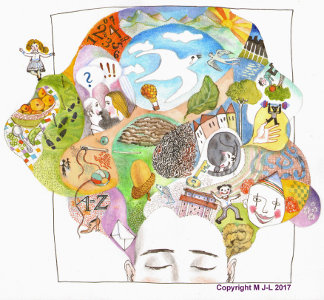Editorial: The brain is not like a computer. No computer will ever be like a brain
Peter Limbrick writes: Should this be obvious? I am not sure. I sense I am being persuaded to believe otherwise. Phrases are creeping into the language that suggest brains are comparable to computers. For instance, I am persuaded to accept that:
· I am hard wired to do this or that
· I have a memory bank (that might be wiped one day)
· when paying attention, I am inputting data
· my thinking is information processing
· my learning is programming.
I am very strongly minded to resist this insidious persuasion to think of my brain as a computer. The comparison not only elevates computers to levels they will never achieve, but also because it takes such a dim view of the mind/brain of humans and other animals.
‘Mind/brain’ is a useful term that means I do not have to define either or explain where one stops and the other starts. Both phenomena are shrouded in mystery. We hardly yet know what they do or how they do it. Nor are we sure where they are: we are learning that the brain and the gut (where the butterflies are) are intimately connected and interdependent; the clever octopus, that can unscrew jars to get food, keeps her five hundred million neurons spread through her body and eight legs without bothering to collect them all together into a brain in her head; many of us when talking about our mind put our hands over our hearts; Zen meditators calm their mind by focussing their attention somewhere below the navel. Sheldrake describes morphic fields of mental activity that are not confined to the insides of our heads. I take comfort that our mind/brains are still a magical mystery.
Dare I suggest that most psychologists, psychiatrists and neuroscientists know very little about how their own mind/brains work? Such an exploration has not been part of their training. How much do you know about your own? Perhaps as little as I do about mine.
Given the infinite variety of mind/brains in members of the human species, it is inevitable that some will almost mirror computers with a lack of emotions, imagination and empathy. Perhaps it is people with these mind/brains who are most comfortable with the comparison between brains and computers. Perhaps it is these people who are working so hard to bring computers into every aspect of our personal, family and social lives.
Perhaps, as we allow, even encourage, our children to become addicted to computerised gadgets from the nursery onwards, we are creating a generation in which mind/brains lacking emotions, imagination and empathy become ever more common. Then the comparison between brains and computers will acceptable.
Linked reading:
The Embodied Mind: Cognitive Science and Human Experience. Book by Francisco J. Varela, Eleanor Rosch and Evan Thompson
The Presence of the Past: Morphic Resonance and the Habits of Nature by Rupert Sheldrake
Other Minds: The Octopus and the evolution of intelligent life. By Peter Godfrey-Smith
ZEN Training: Methods and Philosophy by Katsuki Sekida
Cartoon from TAC Bulletin Issue 204:


